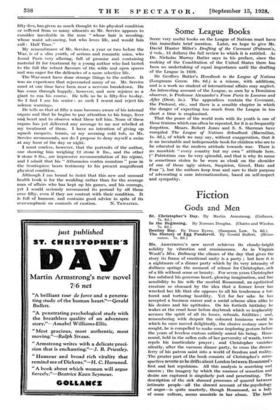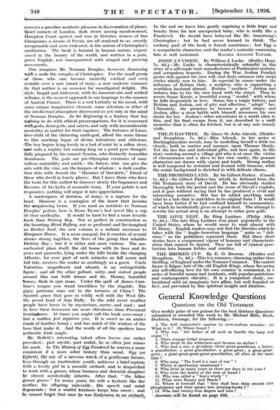Fiction
Gods and Men
MR. ARMSTRONG'S new novel achieves its cloudy-bright solidity by vibration and reminiscence. As in Virginia
Woolf's Mrs. Dalloway the climax of the day that gives the story its frame of emotional unity is a party ; but here it is a nightmare of a dinner party which by its very intensity of dullness springs the moment of release for Christopher, sick of a life without sense or beauty. For seven years Christopher has subdued his generous heart, glowing imagination, and fine sensibility to his wife the morbid Rosamund, an egotistical
creature so obsessed by the idea that a former lover has wrecked her life that she opposes.to all his tenderness a tor-
tured and torturing hostility. Yet for her sake he has accepted a business career and a social scheme alien alike to his desires and his aptitudes. On his fortieth birthday he wakes at the cruel hour before daybreak which so implacably accuses the spirit of all its losses, refusals, futilities ; and, remembering with despair the coloured luminous world in which he once moved delightedly, the elusive ecstasy once he sought, he is compelled to make some imploring gesture before the years of loveless custom entirely annul his being. Rosa- mund, held in the sullen coils of her perversity of wrath, twice repels his inarticulate prayer ; and Christopher vanishes silently, after the vacuous dinner party, to cross the dream- ferry of his patron saint into a world of freedom and reality.
The greater part of the book consists of Christopher's retro- spective reverie as he drifts about London between Rosamund's first and last repulsions. All this analysis is searching and sincere ; the imagery by which the nuances of sensation and desire are captured is singularly just and penetrating! The description of the sick shamed processes of quarrel between intimate people—all the shrewd account of the psychology of anger—is quite masterly, though Rosamund, as a lady of some culture, seems unsubtle in her abuse. The _book
conveys a.peculiar aesthetiepleasure-in its evocation of places. Quiet corners of London, dark rivers among meadowsweet, Hampton Court apricot and rose in October, towers of San Gimignano, a dream of Persia, are all rendered to us, sweetly recognizable and more endeared, in the mirror of Christopher's Meditation. The book is learned in human nature, experi- enced in the beauty of the world, and written in a pure, grave English, not unacquainted with winged and piercing Movements.
One imagines Mr. Norman Douglas, however, dismissing w.itll a smile the scruples of Christopher. For the small group of those who can become mentally excited and eve') ecstatic over a rare brand of irony, a new sardonic romance . by that author is an occasion for unmitigated delight. His `o style, limpid and iridescent, with its innocent airs and wicked refrains, is the nearest approach in our language to the manner of Anatole France. There is a real Latinity in his mood, with some unique imaginative element, some selenium or other of the intellectual atmosphere discovered as yet only in the mind of Norman Douglas. In the Beginning is a fantasy that has hojthing to do with ethical preoccupations, for it is concerned 'with gods, demi-gods, and satyrs, and only with inconsiderable mortality as matter for their caprices.. The fortunes of Linus, love-child of the clattering earth-god, afford the main theme to this mocking fugue of divine intentions and oblivionk .The boy begins lying lovely in a bed of mint by a sullen river, -,lid ends a mighty but crazing king on a great pyre thought- Vully prepared by his consort Symira, who distinctly resemblei .Semiramis. The gods are pre-Olympian creatures, of mar: 'yellous mutability and mirth : the Satyrs, who can give the arts with the vine, are the keepers of wisdom : a dark exulta- tion stirs with Aroudi the " Haunter of Outskirts," friend of those who dwell in lonely places. But I leave those who have the taste for this author to discover slowly the fragrances and flavours of his kylix of aromatic irony. If your palate is not responsive, nothing will argue it into appreciation. A masterpiece of derision, of irony, is a rapture for the head. Humour is a contagion of the heart that invades the- acquiescing brain. If you need an antidote to Norman Douglas' potion, here is Donn Byrne's last novel like a cup of clear metheglin. It would be hard to find a more lovable ,book than Destiny Bay. Not so perfect in construction as the haunting Blind Raftery, nor so profound and far-imagined as Brother Saul, the new volume is a radiant successor to Hangman House. It is more unequal, for it consists of several stories strung together, the lives of the group that inhabits
Dettiny Bay ; but it is richer and more various. The sea- enchanted place itself, the old house with its bees and its .yews and peacocks, lying under the hills beside the changing Atlantic, for ever part of such miracles as full moon and full tide, receives the reader as soothingly as a guest. Uncle Valentine, magnificent and absurd, is an unforgettable figure ; and all the other gallant, witty, and violent people around him can both dream and do. Horses, beautiful JhOrses, .flash in epic races. Under the spell of James Car- bine's tongue you stand breathless by the ringside. The gipsy patteran runs out to the terraces of China ! The
Spanish grace that goes so wildly well with the West lifts the proud head of Ann Dolly. In the wild sweet weather
people have leave to be mysterious, merry, and mad ; and in love these horsemen are more chivalrous than Provencal troubadours. At times you might call the book over-sweet ; but a hidden jest reproves you. It is sweet as an amber comb of heather honey ; and has much of the wisdom of the bees that make it. And the words of all the speakers have authentic Irish magic.
Mr. Bullett's interesting talent often leaves one rather provoked ; part mystic, part realist, he so often just misses his mark. In The History of Egg Pandervil he weaves a more consistent if a more sober history than usual. Egg (or Egbert), the son of a nervous wreck of a gentleman fanner,
lives -through an inarticulate youth, achieves a brief rapture
with a lovely girl 'in a moonlit orchard, and is despatdhed to work with a grocer, whose business and shrewish daughter
he almost accidentally inherits. After that, " the fallen grocer groces " for weary yeark his wife a hysteric like her Mother, his offspring unlovable. - His speech and mind degenerate ; but a wistful kindness keeps him sweet ; and he cannot forget that once he was Endymion in ;anorchard.
In the end we leave him gently regaining a little hope and beauty from his last unexpected baby, who is really like a Pandervil. He should have behaved like Mr. Armstrong's Christopher ; but he had never learned to think. The cockney part of the book is forced sometimes ; but Egg is a sympathetic character, and the reader's curiosity concerning







































 Previous page
Previous page